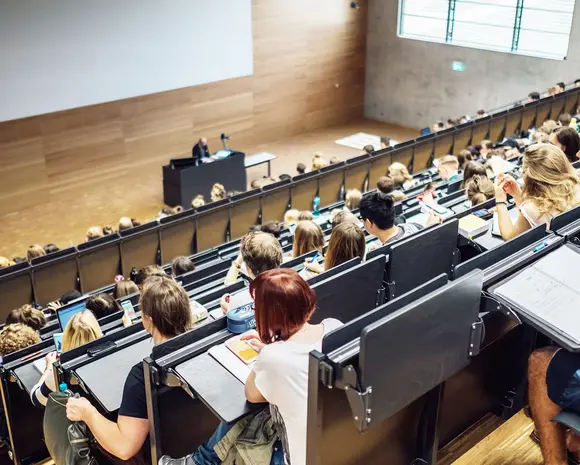There are various ways and channels through which University Communications can support you in this endeavour:
- We report on research results, new colleagues, third-party funding successes or major events in press releases and news.
- We publish articles on research topics and current issues in our research blog "WortMelder".
- We publish articles on research topics and current issues in our podcast.
- We present new publications/monographs.
- We publish profiles of research and externally funded projects at the University of Erfurt.
- We include you as a researcher in our pool of experts and put you in touch with experts for interviews and enquiries.
- We offer topics (essays) to the media.
- We support you with print products for research communication.
- We publish your research video on our YouTube channel.
- We would be delighted if you present your research at our "Long Night of Sciences"!
- We flank all of this via our social media channels.
Communicating knowledge – a guide from the "Junge Akademie"
Crisis situations such as the Covid-19 pandemic have shown just how important sound research communication is. Well-founded, up-to-date knowledge from various scientific disciplines is also necessary for social discussions on efficient measures to combat climate change or issues of social justice. To ensure that communication between science, society and the media is as successful as possible, the Junge Akademie's "Communicating knowledge" project group has developed five key points for research communication following discussions with numerous experts. The guidelines argue in favour of a clear separation of factual basis, level of knowledge and evaluation, advocate a realistic classification of extreme values in the debate and want to encourage communicators to trust the public with more complexity. In this way, public discourse can become more objective.
The Junge Akademie guidelines are available for download under the Creative Commons licence CC BY-ND 4.0 (in German only).
Short video clips for contemporary research communication
An effective means of making scientific content accessible and counteracting misinformation, especially for a younger generation, are short video clips that scientists can present on their social media channels or websites, for example, to present their research results and scientific expertise. The Alexander von Humboldt Institute for Internet and Society has created a guide to creating short videos on platforms such as TikTok and Instagram, which is aimed specifically at researchers who are enthusiastic about research communication and want to learn about storytelling, video editing and audience interaction techniques in order to place their topics in a contemporary way.
You can find the guide here.
Visibility of women in science
As part of the “Professor:inSicht” project funded by the Federal Ministry of Education and Research, an interdisciplinary team from Munich University of Applied Sciences analysed the visibility of women in science. Based on its research findings, the project team has developed the interactive platform "sichtbar.sein.selbst.gestalten" developed. Here, female scientists can find research-based information on how to shape their visibility in a personalised and authentic way. Based on the individual goals and time resources of the scientist, numerous recommendations for action are provided. The best-practice tips can be selected individually and downloaded in a clear handout. This offer helps female scientists to understand visibility, reduce concerns and develop strategies for creating visibility. The service was developed as part of the BMBF-funded meta project "Innovative Women in Focus" (meta-IFIF) which is supported by the Federal Association of University Communications.
Support in the event of hostility and attacks on scientists
Anyone who speaks publicly about science and research runs the risk of experiencing hostility and attacks or receiving hate comments – especially when it comes to politicised topics. The good news is that there is support for those affected. In addition to organisations that are generally committed to combating hate speech, there are now also services that specialise specifically in supporting scientists – the SciComm Support for example. It is a national contact point for attacks and unobjective conflicts in research communication and a joint institution of the Federal Association of University Communications and “Wissenschaft im Dialog”. SciComm Support is available daily from 7 a.m. to 10 p.m. on 0157 923 448 04 for free personal counselling. It also offers a guide that provides an overview of possible courses of action and strategies for dealing with (digital) violence and hate speech and answers the most important questions.
We have compiled further contact points and counselling services in cases of violence and/or discrimination on our website www.uni-erfurt.de/en/university/consulting-service/emergencies-and-complaints/help-in-case-of-discrimination-harassment-and-violence.
Downloads
In addition to our templates for posters or Power Point presentations in the university's corporate design ( log-in-protected area of the website), we provide you here with working aids for academic presentations.



